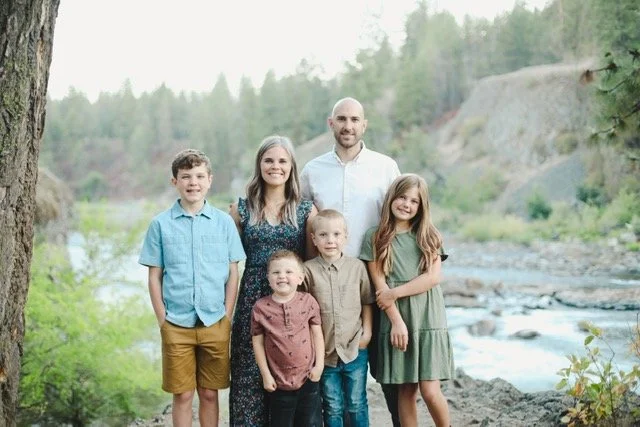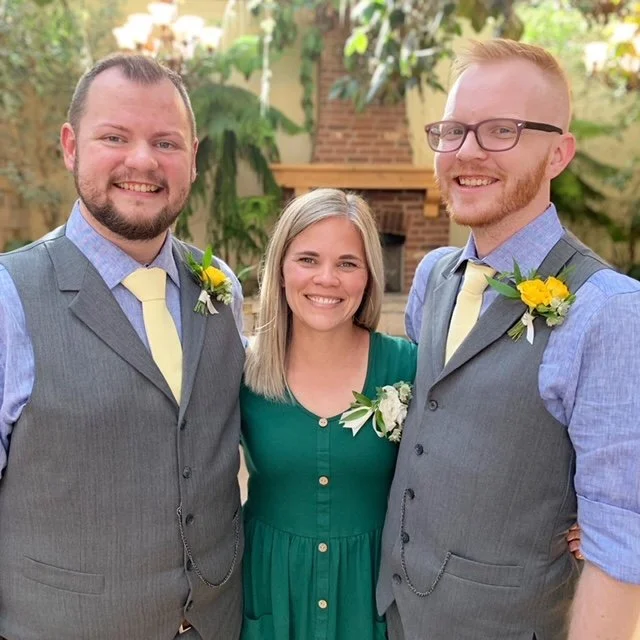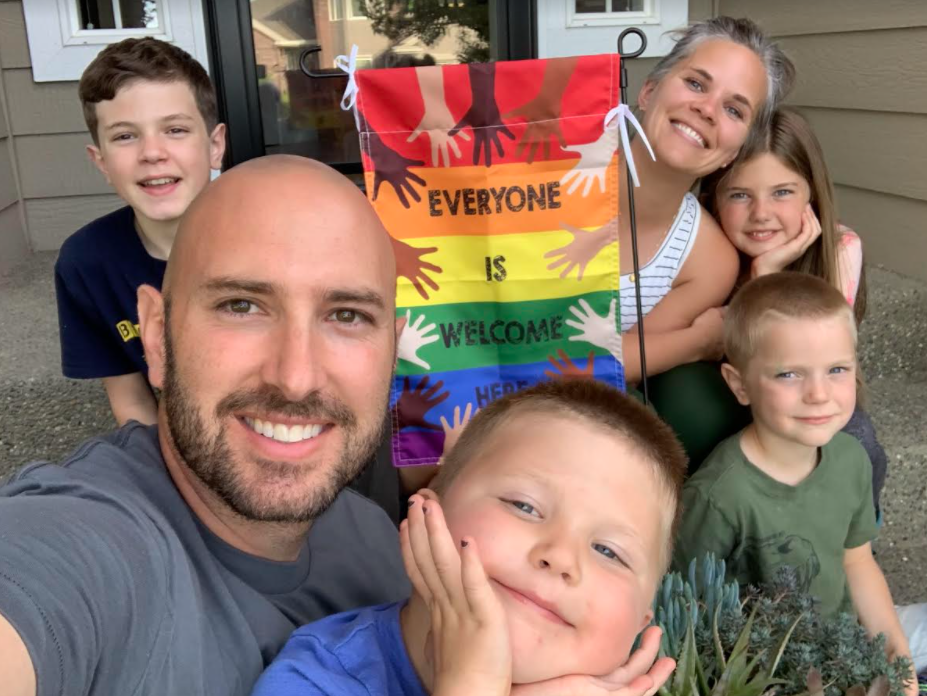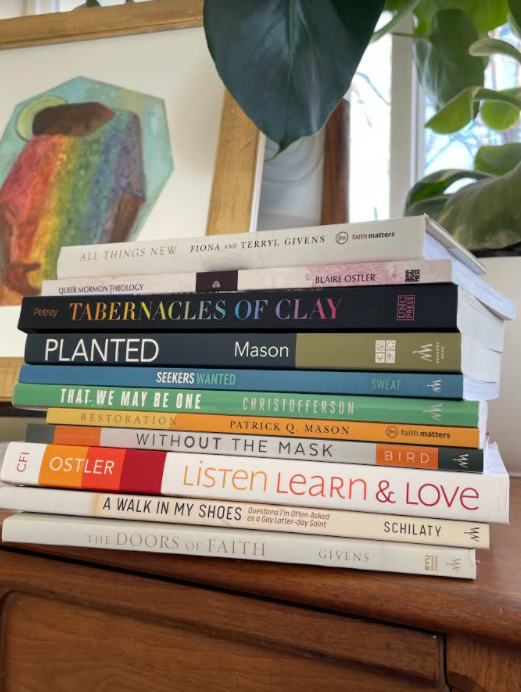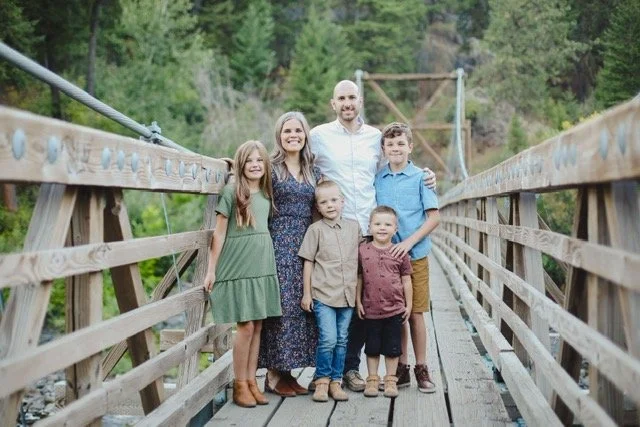After 14 years of marriage, Lindsey and Keegan Bench of Spokane, WA have defined their role in their church and community as strong allies willing to speak up in love for the marginalized. Because this was a found path for them, rather than an inherent one, they bring the added asset of understanding where others are coming from who might still struggle to be stone catchers in a world filled with stone throwers. But Lindsey and Keegan are the first to admit, it took time to get here. In fact, when Lindsey’s brother first came out as gay over a decade ago, they weren’t even on the same page with each other when it came to understanding LGBTQ issues. Now, united in their quest to break down the fortresses that prevent us from fully embracing God’s love for all, Lindsey and Keegan Bench are grateful to have glimpsed what it means to expand the tent of Zion.
Lindsey says she was born and bred in the “typical, picture-perfect Mormon family.” But their Utah county home was rocked when Lindsey’s brother came out while in high school. Without proper resources to support him, the family struggled to know what to do. Some local church leaders advised Lindsey’s parents they were not to let her brother take the lead of his life, and tried to give counsel as to how he could try to be straight and dismiss this aspect of himself. But all this did was make her family sense that perhaps they could not trust their priesthood leaders. Newlyweds Lindsey and Keegan were living at home at the time with her parents and brother, and they sadly watched as some ward members who had always embraced her brother quietly pulled away. Lindsey reasons, “I know it wasn’t malicious; they didn’t know how to respond. But it was painful watching my family end up on an island. A community that once felt safe and sacred suddenly didn’t feel so safe.”
Even some extended family members distanced themselves, and Lindsey was hurt when they’d ask about every family member except her brother, as if they’d erased him from their lives. It hurt even worse when years later, they would avoid the topic of his wedding altogether, as if it never happened. But all along, inside Lindsey’s home, each of her immediate family members had the same personal revelation: to just love their brother, and to each figure out what that meant for them. For Lindsey, she felt something like the cracking of a shell -- a pull to deconstruct and break down everything she had been taught about the heteronormative, gender-focused, family-centric “plan” as she reevaluated where her family now fit.
Lindsey’s shell continued to crack as she would sit through talk after talk in church that would “remind me my brother’s desire for true companionship was a ‘sin.’ But as I watched him pursue that desire, it didn’t look and feel like a sin to me. This was hard for me to reconcile.” As she reflected on the future of her promised eternal family unit, Lindsey realized that a kingdom that excluded gay family members was no heaven at all. She says, “I’d rather be in a lesser place with my whole family than with a God who wouldn’t allow some of them in because of their desire for the wholeness found in committed, intimate relationships. So many things started to not make sense.” As the church evolved in their teachings (by eventually acknowledging that people don’t choose to be gay, and can’t change it), Lindsey continued to question. “Policies created ‘in the name of God’ that excluded people from saving ordinances in the church were SO painful. Then, we saw the same policies rescinded in the name of God. It was like… is God homophobic, or are they not? Why can’t God make up their mind? It was then I realized this isn’t God’s problem; it’s ours. When we as humans put our own prejudices and faults on God, people give up on God. And that’s on us. It’s painful.”
Lindsey had moments when she found herself telling others, “We’re just so grateful my brother doesn’t have a testimony of the church because he doesn’t have to reconcile who he is.” One day, she says she realized how absurd that felt – knowing her family member was healthier, safer, and happier because he was no longer in the church. At the same time, she was watching one of her close, LDS gay friends struggle with depression and suicidal thoughts while he tried to stay in the church. “The happiness we are promised if we do what we’re told – which for them at the time would be to enter a mixed-orientation marriage – does not only NOT bring happiness, but destroys lives. It was hugely problematic and eye-opening for me.”
As Lindsey internally processed all this, she struggled with her construct of God. Rather than trusting God, she started to fear Him. But ironically, she says it was attending her brother’s wedding that started to reverse that. She’d grown up hearing “the gay agenda” would destroy families, but as she watched the happiness of her brother and his adored-by-all husband as they committed their lives to each other, Lindsey no longer believed that. She officially realized his marriage in no way hurt her own. Lindsey says it was “a holy, joyous experience watching my brother and his husband find each other, and the healing that took place. He came alive; we had our brother back.” Her family describes the wedding as a beautiful day and they were pleased so many from their ward and his life did show up to celebrate.
Lindsey admits she had never actually asked God if gay marriage was wrong until her brother’s wedding – “probably out of fear.” But now she says she’s “so grateful for the personal revelation I received that God would not ask people to forgo companionship in this life. Honestly, the sweet fruits of my brother's beautiful love with his husband are what introduced me to the real God for the first time. This opening has healed me, taught me about my own worth, and the worth of all souls.”
Keegan says he’s now on the same page as his wife, though he took a more circuitous path to get there. In the early days of their marriage, Keegan faithfully embraced the religious dogma of the time that led him to believe that homosexuality was wickedness and could never bring happiness. He admits, “Like Elder Packer, I refused to believe that a loving God would allow anyone to be born ‘that way’ and as a result there would be a way to reverse those ‘innate tendencies’ while in this life.” But over time, that quandary took on new weight. Keegan explains, “As I began looking inward at my own sexual and gender identity and how it had developed naturally over time, I began to imagine being asked to reverse that process by any means possible. The prospect was sobering. I felt that if I was unwilling to give up my current relationship with Lindsey and my children, as a sacrifice for ‘something better’ in the eternities, then I could no longer ask others to do the same. I began to be haunted by the way I had dismissed the pain felt in the LDS-LGBTQ community. How I had assumed it was all natural consequences of sinful behaviors – God’s way of inviting them to repent. I realized it was actually me who needed to repent.” He began to transition from his allegiant obedience to “infallible church leaders” and instead began taking responsibility for his own actions and beliefs. “I began asking myself why I believed what I did, was I actually using the Spirit to guide my life or the words of select leaders? If I open my ears to some but close them to others, am I allowing the Spirit to testify of ALL TRUTH or just the stuff I’m willing to listen to? Using this newfound curiosity to seek out the lived experiences of all those around me has flooded my life with witness after witness that there is a loving God weeping with their LGBTQ children and not because of them, that their happiness is not in fact wickedness.”
It was then that Keegan began the painful process of repentance and educating himself. He credits the brave voices of the LGBTQ+ community found in books and podcasts for helping to prepare him for a profound spiritual experience he had while “walking in Ben Schilaty’s shoes,” via his book of a similar title. Having tasted the fruits of charity, he felt an urgency to better listen to, learn from, and love all who’ve distanced themselves from the church for any reason. Through calls and texts, Keegan reached out to over 50 friends and family members with differing beliefs in an attempt to ask forgiveness, mourn with those that mourn, celebrate their newfound joy, acknowledge the validity of their concerns, and share those concerns with other church members in hopes that we can do better. Keegan’s own role as a parent and desire for his kids to prioritize their relationships with each other helps him now better understand that as we focus on the first two commandments, that it’s the second one of loving our neighbors – all of them -- that helps us to more fully obey the first. “If we can really love those who we see and know, we can work toward loving a God we don’t exactly see every day. The reverse order is how we actually come to love God.“ Lindsey adds, “Sometimes I think about things in context and it becomes laughable. It’s silly to conceptualize God saying – ‘Oh dang, you loved others too much’.
As the floodgates of understanding broke open for Keegan, too, he and Lindsey came to a reckoning and committed to becoming dedicated allies. They joined Richard Ostler’s Ministering Resources for LGBTQ Facebook group, where they are vocal, and now encourage others to listen to the stories and voices willing to share on sites like Listen, Learn, and Love and Lift & Love. After their efforts to help their stake leaders plan events to increase LGBTQ+ understanding lost momentum, the couple started their own Spokane-area ally group, which has now met twice this year. The Bench family, along with their four children (Asher – 12, Ruby – 10, Milo – 7, and Luca – 4) “hardcore celebrated” last June’s Pride month, which they say may have put off some in their circles, while other relationships were strengthened or formed anew. But they concur they’re prepared to take hits along the way. They warn, “Stone catching is painful and resisting the urge to return fire is hard. Highlighting the stones and the wounds in charitable ways can help soften the hearts and lower the arms of those who continue to feel the need to defend themselves from those who they do not understand. As a church, we are not whole without these marginalized voices.” As Keegan and Lindsey have together embarked on the work of encouraging all to just love the many LGBTQ children coming to earth, they say they’ve also felt their own marriage strengthen. “We feel better prepared to approach the future with informed and unconditional love as stewards of the next generation – in our home, ward, and community at large.”
Lindsey says she is gratefully now at a place where, “I refuse to hurt people in the name of God anymore. In fact, God has asked me to do the opposite. When we put our shortcomings on God and hurt people in the name of God, that is taking Gods’ name in vain. It’s worshiping a false God. God has beckoned me over and over again to learn to just love, love, love. Letting go of the conditions placed on ‘God’s love’ has allowed me to remove those same conditions of love that I put on others and myself. This has been the most freeing, healing, sacred work of my life and I’ve been humbled to experience it. I look forward to a lifetime of continual learning and big, bold love.”
















